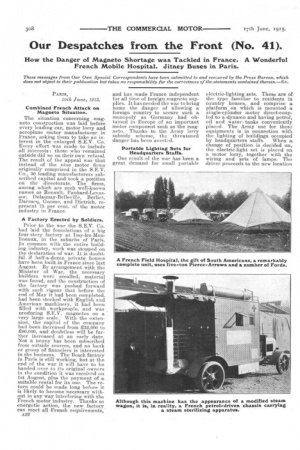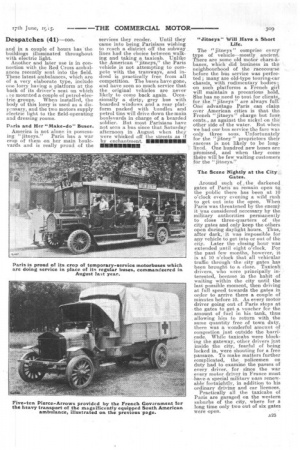Our Despatches from the Front (No. 41).
Page 4

Page 5

If you've noticed an error in this article please click here to report it so we can fix it.
How the Danger of Magneto Shortage was Tackled in France. A Wonderful French Mobile Hospital. Jitney Buses in Paris.
These messages from Our Own Special Correspondents have been submitted to and censored by the Press Bureau, which does not object to their publEcation but takes no responsibility for the correctness of the statements contained therein.—ED.
PARTS,
Combined French Attack on Magneto Situation.
The situation concerning magneto construction was laid before every leading car, motor lorry and aeroplane motor manufacturer in France, asking them to take an interest in the • enlarged S.E.V. Co. Every effort was made to include all interests : those who remained outside did so on their own refusal. The result of the appeal was that instead of the nine motor firms originally comprised in the S.E.V. Co., 30 leading manufacturers subscribed capital and took a position on the directorate. The firms, among which are such well-known names as Renault, Panhard-Levassor, Delaunay-Belleville, Berliet, Darracq, Gnome, and Dietrich, represent 75 per cent. of the motor industry in France.
A Factory Erected by Soldiers.
Prior to the war the S.E.V. Co. had laid the foundations of a big four-story factory at Issy-les-Moulineaux, in the suburbs of Paris. In common with the entire building industry, work was stopped on the declaration of war. It is doubtful if half-a-dozen private houses have been built in Francesince last August. By arrangement _with the Minister of War,the necessary bhilders were reca. lled, material was found,and-the construction of the factory was pushed forward with such vigour, that before the end of May it had been completed, had been stocked with English and American machinery, it had been filled with workpeople, and was producing S.E.V. magnetos on a very large scale. With the extension, the capital of the company had been increased from £32,000 to 280,000, and doubtless will be further increased at an early date. Not a nenny has been subscribed from outside sources, and no bank or group of financiers is interested in the business. The Bosch factory in Paris is still working, but at-the end of the war it will have to be handed over to its original owners in the condition it was received on 1st August, pIus the payment of a suitable rental for its use. The return could be made long before it is likely to become 'necessary without in any way. interfering with the French motor industry. Thanks to energetic action, the new factory can meet all -French requirements,
A22 and has made France independent for all time of foreign magneto supplies. It has needed the war to bring home the danger of allowing a foreign country to secure such a monopoly as Germany bad obtained in Europe of an important motor component such as the magneto. Thanks to the Army lorry subsidy scheme, the threatened danger has been avert:>.(1.
Portable Lighting Sets for Headquarters Staffs.
One result of the war has been a great demand for small portable electric-lighting sets. These are of the type familiar to residents in country houses, and comprise a platform on which is mounted a single-cylinder motor direct-coupled to a dynamo and having petrol, oil and water. tanks conveniently placed. The Army use for these equipments is in connection with the lighting of buildings occupied by headquarters staffs. When a change of position is decided on, the electric-light set is placed on a motor lorry, together with the wiring and sets of lamps. The driver proceeds to the new location and in a couple of hours has the buildings illuminated throughout with electric light.
Another and later use is in connection with the Red Cross ambulances recently sent into the field. These latest ambulances, which are of a very elaborate type, include one lorry having a platform at the back of its driver's seat on which , re mounted a couple of petrol-elec
tric, groups. When installed, the body of this lorry is used as a disn-.•:insary, and the two motors supply electric light to the field-operating and dressing rooms.
Paris and Her "Make-do" Buse!.
America is not alone in possessing " jitneys." Paris has a war crop of them on her main boulevards and is really proud of the
services they render. Until they came into being Parisians wishing to reach a district off the subway lines had the choice between walking and taking a taxicab. Unlike the American. "jitneys," the Paris vehicle is not attempting to compete with the trainwaYs, and indeed is practically free from all competition. The buses have gone, and have seen so much service that the original vehicles are never likely to come back again. Occasionally a dirty; grey bus with boarded windows and a rear platform packed with bundles and petrol tins will drive down the main boulevards in charge of a bearded soldier. But Most Parisians have not seen a bu.s since that Saturday afternoon in. August when they were whisked off the streets As if by enchantment.. MIIMM•••••■






















